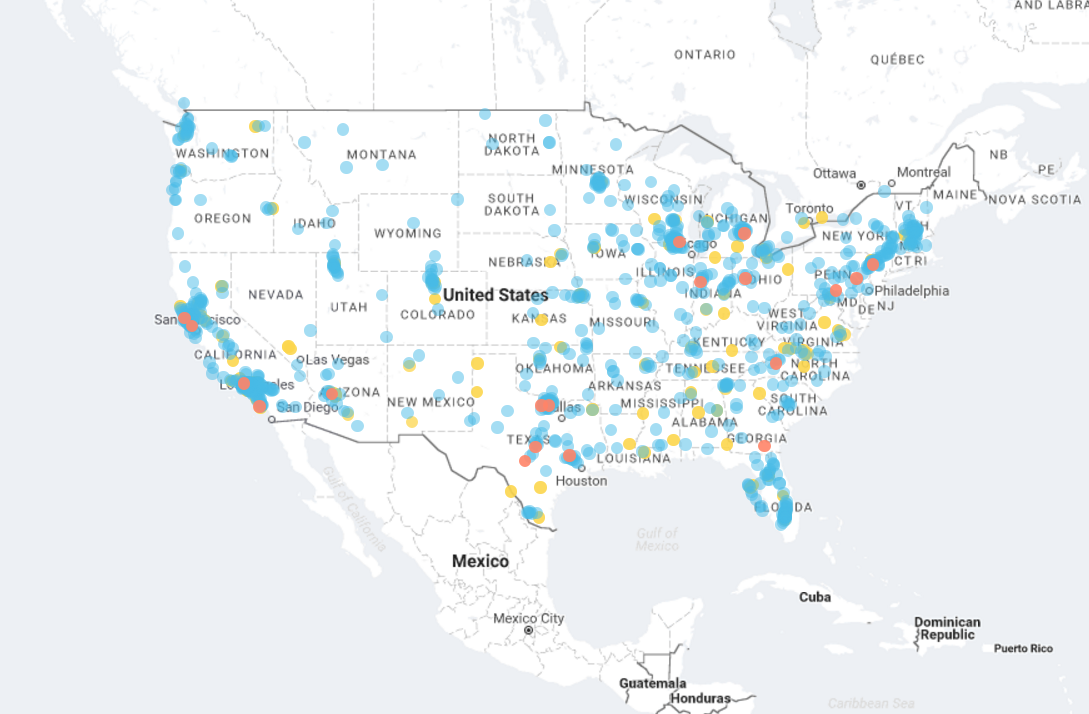Collaborative conference; drug danger; autism map
Autism researchers and advocates gather in San Francisco, nearly one-third of drugs approved in the United States are later linked to safety issues, and an interactive map lays out locations of U.S. autism clinics.
- The International Meeting for Autism Research kicked off Wednesday in San Francisco. The Spectrum team is covering the conference in force.
Autism advocate John Elder Robison is also attending. He hopes to bend scientists’ ears about the types of studies he thinks are likely to be most valuable to the autism community.
“When it comes to autism research, if we want science to address our concerns, we first need to make sure that researchers know what those concerns are,” Robison wrote in an op-ed for STAT.
Robison has authored several books about autism. He has also worked with researchers at Harvard University and the University of Washington on autism research, and has been an autism advisor for the National Institute of Mental Health on hundreds of scientific studies.
“We have a saying in the disability advocacy community, ‘Nothing about us, without us,’” Robison wrote in STAT.
- Almost one-third of drugs approved by the U.S. Food and Drug Administration (FDA) are later linked to health risks, according to a study published Tuesday in the Journal of the American Medical Association.
Drugs must be proven safe and effective to earn FDA approval. But many clinical trials are short and involve fewer than 1,000 people, The Washington Post reports. Safety issues often emerge years after a trial has ended and a large number of consumers have used the medication.
Medications for mental illness and those cleared through the FDA’s fast-track program are particularly prevalent in the list of dangerous drugs.
“We seem to have decided as a society that we want drugs reviewed faster,” lead researcher Joseph Ross told the newspaper. It is essential “that we have a strong system in place to continually evaluate drugs and to communicate new safety concerns quickly and effectively.”
The FDA is set to receive more than $500 million in funding over the next eight years, thanks to the 21st Century Cures Act. One goal of the funding is to speed up the approval process for new drugs.
- A software-testing company based in New York is the latest business tapping the talents of people with autism.
About three-quarters of employees at ULTRA Testing are on the spectrum, founder Rajesh Anandan told the Webby Podcast last week. “We built ULTRA as a company with a very simple mission: to prove that neurodiversity, including autism, could be a competitive advantage in business,” Anandan says in the podcast.
Anandan says people with autism have a wealth of skills necessary for software testing, such as a keen eye for detecting patterns, as well as logical reasoning and intense focus. It’s been four years since Anandan launched ULTRA Testing, which now has more than 50 employees.
Other tech companies, such as SAP and Microsoft, have launched similar programs to recruit people with autism. Spectrum highlighted some of these programs in a story last year, which also details some of the challenges people with autism face in finding and keeping jobs. A story in Broadly this week explores employment challenges specific to women with autism. Many of them struggle in jobs for years because they are undiagnosed, so they don’t receive support.
- Researchers at Stanford University in California have built an interactive map of autism prevalence and resources in the U.S.
The team, led by psychiatry professor Dennis Wall, created GapMap by combining autism estimates from the U.S. Centers for Disease Control and Prevention with data from autism clinics across the country. Families can add their own information to the map, as well as enter their location to find available resources nearby.
The map mirrors data from a study published 4 May in JMIR Public Health Surveillance. Both reveal that proximity to a diagnostic center boosts the likelihood of an autism diagnosis: Overall, people in the U.S. live an average of 50 miles from a diagnostic center, whereas people with autism live an average of 20 miles from one.

- Tom Insel, former director of the National Institute of Mental Health (NIHM), has left his post at Google to launch his own company, Mindstrong, Nature reported on Monday.
Insel spent just 18 months at Google’s life sciences company, Verily. He was NIMH director for 13 years.
Mindstrong’s mission is to develop tools that assess a person’s cognitive function based on smartphone data, such as misspelled words and the time between keystrokes. Verily is working on similar ‘digital phenotyping’ tools.
“I love the idea of rethinking how we measure human behavior,” Insel told Nature.
- Making a career move? Send your news to [email protected].
Recommended reading

New organoid atlas unveils four neurodevelopmental signatures

Glutamate receptors, mRNA transcripts and SYNGAP1; and more

Among brain changes studied in autism, spotlight shifts to subcortex
Explore more from The Transmitter
Can neuroscientists decode memories solely from a map of synaptic connections?

AI-assisted coding: 10 simple rules to maintain scientific rigor
